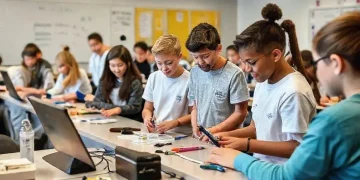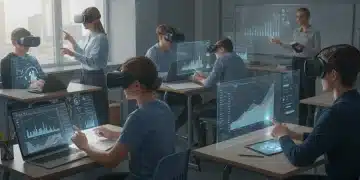Higher education trends redefining university learning

Higher education trends redefining university learning in the digital era emphasize personalized learning, technology integration, and emerging skills that prepare students for the digital workforce, enhancing engagement and accessibility.
Higher education trends redefining university learning in the digital era are reshaping how students engage with knowledge and each other. Have you thought about how these changes could affect your educational journey? Let’s explore these fascinating shifts together.
Impact of technology on learning experiences
The impact of technology on learning experiences is significant in today’s educational landscape. As universities embrace digital tools, students are finding new ways to engage with their studies. This shift allows for a more interactive and personalized learning environment.
Enhancing Student Engagement
Technology offers various tools that can enhance student engagement. Features like interactive quizzes, video lectures, and discussion forums make learning more enjoyable.
- Interactive platforms encourage participation.
- Access to multimedia resources fosters creativity.
- Real-time feedback helps students improve.
Moreover, online discussion forums provide opportunities for students to connect outside the classroom. This collaboration is crucial in building a strong academic community.
The Role of E-Learning Tools
E-learning tools have revolutionized how students access information. With a click, learners can access a wealth of resources tailored to their needs. Platforms like learning management systems help track progress and offer personalized learning pathways.
Integrating e-learning caters to different learning styles, ensuring everyone has a chance to succeed. As universities adapt, the incorporation of technology continues to shape the classroom experience.
Personalized learning in higher education
Personalized learning in higher education has become a focal point in modern education systems. It allows students to experience education tailored to their individual needs, strengths, and interests. This method encourages active participation and deeper understanding.
Benefits of Personalized Learning
When students engage in personalized learning, they find greater satisfaction and motivation. Here are some of the main benefits:
- Learning paced according to individual progress.
- Content adapted to different learning styles.
- Increased engagement through relevant materials.
By focusing on the student’s unique journey, educational institutions can create a more effective learning environment. Educators are discovering the value of adjusting their teaching strategies to meet diverse student needs.
Technological Tools Supporting Personalization
Various technologies support personalized learning experiences. For example, learning analytics helps instructors understand student performance and tailor interventions accordingly. Students can benefit greatly from:
- Adaptive learning software that adjusts difficulty based on skill level.
- Online platforms offering resources that suit preferred learning styles.
- Feedback mechanisms that promote continuous improvement.
These tools foster a dynamic learning environment where students feel empowered to take control of their education. As personalized learning continues to grow, it promises to enhance educational outcomes significantly.
How online courses are shaping the future

How online courses are shaping the future of higher education cannot be overstated. With the advancements in technology, students now have unprecedented access to quality education from anywhere in the world.
Accessibility for All
Online courses have made education more accessible, breaking down barriers that once limited learning opportunities. Students can learn at their own pace from the comfort of their homes, leading to:
- Reduced travel costs associated with traditional schooling.
- Flexible schedules that fit around work and personal commitments.
- Access to a broader range of courses and subjects.
This flexibility is particularly beneficial for non-traditional students, who may have jobs or family responsibilities. Hence, the growth of online learning promotes inclusivity and lifelong learning.
Innovative Learning Methods
Online courses utilize innovative teaching methods that often engage students more effectively than traditional classroom settings. With tools like:
- Interactive video lectures that enhance understanding.
- Discussion boards that foster community and collaboration.
- Quizzes and assignments that test knowledge in real-time.
These methods encourage active participation, which enhances retention of information. As technology progresses, these courses become more immersive and interactive.
The ability to incorporate multimedia resources into online learning has redefined the educational landscape, making lessons more engaging. Furthermore, as demand for skilled workers increases, online courses provide essential skills training, adapting to the needs of the modern job market.
The role of social media in student engagement
The role of social media in student engagement has become vital in today’s educational environment. These platforms create unique opportunities for students to connect and collaborate, both academically and socially.
Building Communities
Social media fosters a sense of community among students. Through groups and discussion forums, students can:
- Share knowledge and study resources.
- Form study groups to enhance learning.
- Support each other through challenges.
This collaboration enhances their educational experience, making learning more enjoyable. Additionally, students can engage with educators in new ways, creating a dynamic classroom environment.
Enhancing Communication
Effective communication is crucial in education. Social media platforms allow for quick and easy communication between students and instructors. With tools for:
- Instant messaging for quick questions.
- Event planning for study sessions and group projects.
- Feedback on assignments shared online.
Such communication promotes active participation in the learning process. Students become more engaged when they feel connected to their peers and teachers.
Moreover, teachers can share announcements, resources, and inspiration through social media, making learning accessible outside the classroom. This flexibility enhances overall student engagement and motivation.
As social media continues to evolve, its impact on education will likely grow, reshaping how students interact and engage in their academic journeys.
Emerging skills for the digital workforce
Emerging skills for the digital workforce are crucial for students preparing to enter today’s job market. As technology continues to evolve, certain skills have become invaluable for success in various industries.
Technical Skills
In the digital age, having strong technical skills is essential. These include:
- Data analysis abilities to interpret information.
- Proficiency in programming languages like Python and Java.
- Understanding of cybersecurity principles to protect information.
These technical competencies help professionals thrive in a technology-driven environment.
Soft Skills
Alongside technical skills, soft skills play a significant role in the workplace. Employers look for individuals who demonstrate:
- Strong communication abilities to express ideas clearly.
- Adaptability to respond to changing circumstances.
- Collaboration skills for effective teamwork.
These soft skills are essential for maintaining a positive workplace culture and driving team success. They enable individuals to work effectively with others, enhancing overall productivity.
Furthermore, critical thinking and problem-solving capabilities are increasingly sought after. Professionals must navigate complex challenges and think innovatively. As the digital landscape continues to change, workers equipped with both technical and soft skills are poised for success.
Educators and institutions must focus on developing these emerging skills to prepare students adequately. By aligning education with industry needs, we can ensure a smooth transition into the workforce and a brighter future for all.
FAQ – Frequently Asked Questions about Higher Education Trends
What are emerging skills for the digital workforce?
Emerging skills include technical abilities like data analysis and programming, as well as soft skills such as communication and teamwork.
How does personalized learning benefit students?
Personalized learning allows education to be tailored to individual needs, enhancing engagement and improving learning outcomes.
What role does technology play in education today?
Technology facilitates access to information, promotes interactive learning, and allows for flexible education options, making learning more effective.
Why is student engagement important in modern education?
Student engagement fosters collaboration, motivation, and a deeper understanding of the material, leading to better academic performance.





